In my home office I have several book shelves. The one closest to my desk is my reference works shelf. This is where I keep my standard reference works (those I often refer to) and specific works I have consulted while writing particular books. This is a short piece about the reference works I have. All links are to LibraryThing and by visiting my reference works collection page on LibraryThing you can find out more about each book.
This is what my shelf looks like: (from 3 photographs photoshopped together)

On the right hand side are the more standard reference works. You can see the Collins dictionary of the English language, the The Penguin Dictionary of First Names (useful for naming characters), The New Princeton Encyclopedia of Poetry and Poetics, Roget’s Thesaurus, and various other useful tomes. It’s not all serious stuff. I have Eats, Shoots and Leaves by Lynne Truss and Red Herrings And White Elephants by Albert Jack. I also have The New Oxford Book of English Verse which is strictly speaking a poetry collection and should really be with my other poetry books. But this is a really useful reference to have if your characters are given to quotation. I suppose I could keep my collected Shakespeare here as well but it’s a pretty big book and the shelf is not infinite. I do have The Penguin Dictionary of Quotations to hand.
To the left of those you can probably spot the Italian dictionary and the book of French sayings. My other French books are at work where I last left them after taking some classes in French. My modern languages are not very good but that’s what the reference works are for. I would advise that you don’t attempt creating a character who speaks a foreign language fluently unless you’ve got a pretty good grasp of that language yourself though!
The Marketing Genius book is for my other job (in Marketing and Communications) but is also useful for an aspiring writer. More specifically for writers are How Not to Write a Novel by David Armstrong and Research for Writers by Ann Hoffmann (no relation). Every writer should have a copy of the Writers and Artists Yearbook but I’ve either lent or given my most recent copy to someone else. Nonetheless it’s a big yellow book and you will need one.
I’ve also got some books about culture and society here. I have Communities in Cyberspace, Tomorrow’s People: How 21st Century Technology is Changing the Way We Think and Feel, Former Child Stars: The Story of America’s Least Wanted, and Why Do People Hate America?. These are some of my particular choices which relate to my interests and my writing but there are some I particularly recommend for everyone. For example Why Are All The Black Kids Sitting Together in the Cafeteria? by Beverly Daniel Tatum, a really excellent introduction to some of the issues, perceptions and false perceptions that cluster around the concepts of race, identity, division and alliance. I also have two books by Terri Apter, someone I know personally and whose work I particularly admire. The two books I have are psychological studies of friendships between girls and relationships between girls and their mothers.
Because I am primarily a science fiction and fantasy author, I have a number of books about writing in that genre as well as a lot of reference works you can see on the far left of the shelf: the Dictionary of Imaginary Places, the New Encyclopedia of Science Fiction, the The Cambridge Companion to Science Fiction by Edward James and The History of Science Fiction by Adam Roberts.
I have been recommending for years How to Write Science Fiction and Fantasy by Orson Scott Card. It’s a very good intro to the basics of effective plotting in an alien world. I have a lot of other books in a similar vein and I recommend scrolling through the list on LibraryThing. Deconstructing the Starships by Gwyneth Jones is advanced reading, in that it expects you to be familiar with certain genre classics. The Tough Guide to Fantasyland also expects a certain familiarity of fantasy tropes and serves as a humorous guide to genre clichés.
The other books currently on these shelves either relate to Roundabout, a contempory teenage fiction novel about travellers I published with Macmillan a few years ago, or to Ghost of a Chance, my forthcoming teenage supernatural thriller for Oxford University Press. If you’re interested in the kind of books I read as research, these are pretty good examples. For example, the collection I’ve amassed for Ghost of a Chance includes: Life in the English Country House: A Social and Architectural History, A Country House at Work: Three Centuries of Dunham Massey, What the Butler Saw: Two Hundred and Fifty Years of the Servant Problem, The Big House: The Story of a Country House and Its Family, Keeping Their Place: Domestic Service in the Country House, The Music Room and Truly Weird: Real-Life Cases Of The Paranormal. As you can see, I am referring to information about history, architecture, social history, servant culture, aristocratic culture and one book about the paranormal. I have also written a book about the paranormal for which there were an earlier set of reference works, now shelved elsewhere, which is why there’s only one book of this type although the novel will be a lot more supernatural in tone and subject. Handle with Care: An Investigation into the Care System is a reference work for another potential novel, as is The Parenting Puzzle: How to Get the Best Out of Family Life.
There are currently 61 reference works on this shelf and this does not include those sitting on my too read pile or the four new books that arrived through the post today. If you’re viewing the library thing page in a couple of months you may see a shift in what’s collected here.
At a later date I’ll write about how I use fiction for reference, but for that we’ll need to explore and catalogue the 10 shelves of my science fiction and fantasy collection and I’ve not yet listed them all on LibraryThing.
I hope that’s been useful and interesting as a tour through one writer’s collection of reference works. If you’d like to explore what else I’ve catalogued online with LibraryThing or to link to me there, please feel free. Some books have my ratings and comments attached and you can also use my tags to find out what books I have in certain categories or genres. Start by visiting my reference works collection page on LibraryThing and then explore from there.
 I’ve been on a book buying binge. I blame Amazon recommendations – which were actually spot on for a change instead of suggesting books based on presents I bought for other people. I came back from Wales to a heap of oblongs all for me:
I’ve been on a book buying binge. I blame Amazon recommendations – which were actually spot on for a change instead of suggesting books based on presents I bought for other people. I came back from Wales to a heap of oblongs all for me:
